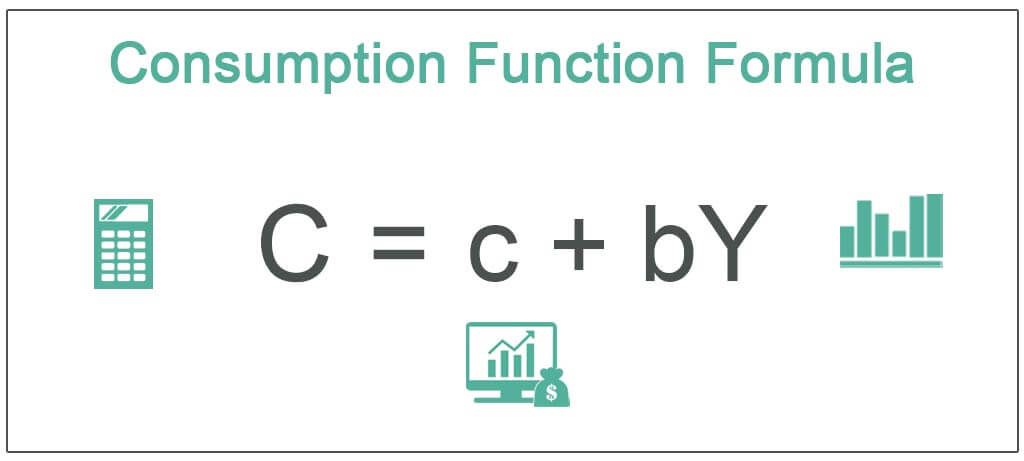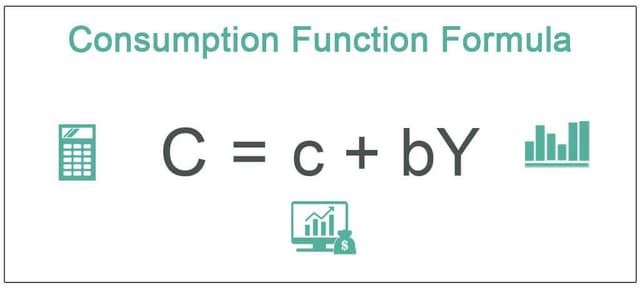Table Of Contents
Key Takeways
- The consumption function is an economic formula directly associated with the total consumption and gross national income.
- It was introduced by the British economist John Maynard Keynes to show the correlation between income and expenditure and the income proportion spent on goods.
- It is related to income and wealth. It is a direct income function of income. Therefore, its functional relationship to consumption varies as income differs.
- The consumption function theory explains that low consumption results in high economic savings. The saving amount increases with income as only the consumption function increases.
What is the Consumption Function?
The consumption function is an economic formula that directly connects total consumption and gross national income. The process introduced by the British economist John Maynard Keynes indicates the relationship between income and expenditure and the proportion of income spent on goods.
Key Takeaways
Explanation
- It suggests that revenue and the rate of increase or decrease in consumer spending are determined by income. This concept is not stable in the long run because income changes and consumption patterns change.
- This function is assumed to be balanced, and expenditures determine the income level. For a good concept to last long, it must be durable to reach equilibrium.
Consumption Function Formula
Below is the equation of the consumption function.
C = c + bY
C - Total Consumption
c - Autonomous Consumption (minimum consumption for survival when income is zero).
- Autonomous consumption is not influenced by income – We must understand that consumption can never be zero. If the earnings become zero, minimum consumption is never nullified. Such consumption is called autonomous consumption. If income is low, there is a minimum level of expenditure that is higher than the income. In such a case, consumption has to be maintained irrespective of income. The minimum level of consumption is said to be autonomous consumption.
- Induced consumption (bY) (influenced by income) – bY; b is the marginal propensity to consume (which means the consumption level increases for every rupee increase in the revenue). Induced consumption is influenced by income. Y indicates, i.e., income.
- Break-even point – When consumption expenditure reaches the income, it is called the break-even point stage if there is no concept of saving.

Examples
Let us deal with some examples to understand this concept in detail:
Calculate the consumption level Y= ₹1000 crores if the consumption function is C=200+0.5y?
Solution:
Use the below data for the calculation of total consumption: -
| Particulars | Value |
|---|---|
| Income (Y) | 1000 |
| Marginal Propensity (b) | 0.5 |
| Autonomous Consumption (c) | 200 |
By applying the formula
Total Consumption (C) will be: -

Consumption Function Calculator
You can use this calculator.
Consumption Function Formula= c + bY
0 + 0 * 0 = 0
Relevance and Uses
- Consumption function equation describes C = c+bY.
- If the value of (By) is higher, the total consumption value will increase. It certainly says that if income increases, expenditure also increases. We must consider that the income increase rate is more than the expenditure increase rate. People having high incomes will have a lower average propensity to spend.
- Real consumption expenditure is a stable function of real income.
- The utility is adopted by consumption.
- The immediate satisfaction of human needs has to appear by consumption.
- Consumption is only a form of good change.
- Consumption is a direct function of income. Its functional relationship to consumption varies as income varies.
- It allows an overview of the business expenditures in the whole financial year.
- It helps predict future expenditures, usually due to a thorough study of the previous spending.
- Consumption is a function related to income and wealth.
- Consumption is the largest component of the nation's gross domestic product which plays a prominent role in the nation's economy.
- The consumption function depends on the interest rates, but it is not a significant factor.
- This theory clarifies that low consumption results in high savings for the economy. The saving amount increases with an increase in income as the consumption function solely increases with income.

